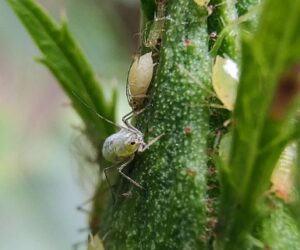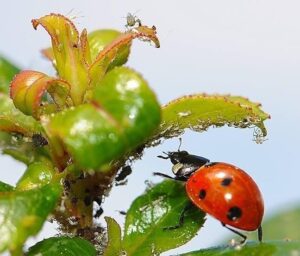There’s a lot of talk and speculation around the topic of aphids on plants. The consensus appears that aphids are definitely harmful to plants, but some people believe otherwise, and some believe that they are beneficial.
Aphids are tiny creatures that feed on plants. They can be a nuisance because they tend to multiply quickly and thrive in warm, dry weather conditions. Aside from multiplying quickly, what harm can they cause to plants?
Aphids can impact the health of your plants by sucking plant juices, causing the plants to start wilting and dying off. While they can adversely affect your garden, you can eliminate the problem without killing off the entire colony.
Fortunately, there are ways to keep aphids away from your plants, but it’s important to know the effectiveness of aphids before deciding on any treatment.
Is aphid infestation on your plants harmful to them?
The short answer is Yes. There are over 250 species of aphids, most of which are tag pests. But it depends on how much damage they are doing and what you can do to prevent it.
Aphids are tiny insects that look like black, green, or sometimes yellow dots on plants. They feed on plants by sucking sap from their leaves and stems, which causes the leaves to curl up or droop. They can also transmit diseases to plants if they’re not treated properly.

By feeding on plant sap, they cause many different types of damage. They can weaken the plants’ ability to defend themselves against other pests and diseases, which is why they’re often treated with pesticides before they have time to cause widespread damage.
Aphid infestation is often a sign of poor soil health or other problems in your garden’s ecosystem. If you see aphids attacking your plants, it’s best to start by testing the soil with a home test kit before you spend money on pesticides or other remedies. If there’s still an issue, you can use beneficial insects as natural pest control by releasing them onto your plants every few weeks.
What diseases do aphids cause?
Aphids are a common problem for home gardens and lawns. They cause damage to the leaves and stems of plants and can even cause the death of a plant.
There are several different species of aphids, and they are in different colors green, black, and yellow. But what disease do aphids cause?
Well, it turns out that aphids can give off viruses. These viruses do not cause any harm on their own; instead, they serve as a vehicle for other organisms (like bacteria) to move through the plant tissue and infect other parts. These result in issues like leaf drop, stem dieback, or even necrosis (cracking).
There are a number of diseases caused by aphids. The most common is the bacterial disease mycosis, which causes a red swelling at the base of the leaf.
They can transmit several viruses, including the potato virus Y, tomato spotted wilt virus, tomato yellow leaf curl virus, and tobacco mosaic virus.
Some of the diseases aphids transmit include:
- Grapevine phyllody (a disease caused by aphids that cause leaves to curl)
- Cucumber mosaic virus
- potato leaf roll,
- yellow net
- yellows viruses of sugar beet,
- cauliflower mosaic,
- plum pox,
- lettuce mosaic, and turnip
- mosaic virus.
- Leafhoppers
- citrus tristeza virus
In addition to these viruses, aphids can cause bacterial diseases that cause stunting, yellowing, and other symptoms on plants like tomato mosaic and pepper mosaic viruses (PMVs). These can be treated with insecticidal soap or pyrethrin concentrate and applied to affected plants as a spray or dip treatment.
So, Where do aphids come from
Aphids can be found in every corner of the world, but they’re most common in warm climates. The most common way that aphids get onto plants is by being carried there by the wind or water.
Some aphids can fly and navigate themselves to new plants, while others may be blown in by the wind. Aphids can also be transported over short distances via animals that come into contact with them.
They may also hitchhike on insects or other animals or even move into a new area by being carried by wind or water. These pests usually come from plant debris, such as fallen leaves or flower petals.

What plants are affected by aphids
Aphids attack plants from all over the world. They’re attracted to already weak plants and can cause serious damage to your garden if you don’t get rid of them.
Aphids generally prefer young leaves and new growth, so aphids will be drawn to them if you’re growing flowers or vegetables. They can also make their way into your houseplants if they go through the window screens or doors of your home.
They can be found on most plants, including trees and shrubs, lawns and ornamental plants, roses, beans, corn, and tomatoes.
Aphids tend to attack young plants and young fruit. They will often attack the leaves or stems of plants if there is a lack of nutrients in the soil. Aphids can also attack older fruits, such as apples or pears, when they are at risk of rotting from decay or frost damage. They love to attack certain plants more than others: alfalfa, apples, apricots, beans, cabbage, cauliflower, celery seedlings, small pumpkins, Euphorbia, Alliums (onions, garlic, chives), Solanum (potatoes, eggplants), Cactus, Lettuce, Cucumber, Cantaloupe, Watermelon, Tomato, Peppers and many more.
Aphids treatment
Now you know aphids are bad. They suck up all the goodness from your plants and spread disease. But what if there was a way to eliminate them without killing your plants?
There are many natural ways to control aphids. Still, it’s important to remember that these methods should be used only in combination with other methods, not as a replacement for pesticides or other chemicals. Here are some methods to treat aphids on your plant.
Spray with soap and water
One of the best and easiest ways to get rid of aphids is by spraying them with soapy water. Spray with a mixture of water and dish soap. This will help wash them off your plants and leaves, so they don’t return.
This will kill the aphids immediately, damaging their wings and leaving them vulnerable to predators. Spray daily, and you should be able to keep them at bay. If they are still a problem, you can also use a spray containing an insecticide such as pyrethrin or permethrin.
Apply neem oil
Neem oil is a natural pesticide that helps reduce the growth of aphids by killing them off before they have a chance to reproduce. It can also be used as an insecticide on leaves, flowers, fruit, and stems.
You can apply neem oil directly to the affected area; you can do that by mixing cold-pressed neem oil with water in a spray bottle and applying it on plants that need it most.
You should shake the bottle well before use. This method is safe for pets and kids. You can also buy a ready-made neem oil spray if you need more time to make one.
Use aphid predators

Aphid predators are insect pests that prey on aphids. Aphid predators do not harm your plants directly, but they can help prevent aphids from spreading to other areas. They include ladybugs, lacewings, and parasitic wasps.
The best way to use aphid predators is by releasing them into your garden area. They will feed on many aphids as possible. This will help reduce their population and keep your plants healthy. You can use natural predators or predators that are commercially available.
Rubbing alcohol spray
Another effective method is to use rubbing alcohol and water, which will kill the aphids immediately without leaving any residue behind.
Mix one part rubbing alcohol with two parts water, and spray it on your plants. The alcohol will kill the aphids but won’t harm your plants.
You can also buy an organic spray that is made of essential oils and plant extracts. This will not only kill the aphids, but it can also help repel them in the future by making their life miserable!
Apply apple cider vinegar
Apple cider vinegar is another natural pesticide that can help you treat aphids on your plant. It’s inexpensive and easy to use.
Applying apple cider vinegar directly to the plant can also be effective. But make sure to dilute it with water before applying it to your plants.
To apply apple cider vinegar to your plants:
- Pour one cup of apple cider vinegar into a spray bottle.
- Spray the vinegar onto your plant’s leaves directly where you see aphids on the leaves—the closer to their bodies, the more effective it will be at killing them off.
Repeat this process every three or four days until you have eradicated all of your aphids from the plant—you’ll know they’re gone because they won’t be moving around anymore.
Ammonia spray
Ammonia is a common household chemical that can be used to kill aphids and other small insects. It’s easy to use and it’s inexpensive, so it’s worth a try if you have no other options available.
You can use ammonia in a spray bottle or fogger to kill aphids on plants and on fruit trees and bushes. It can be used alone or in combination with other pesticides. Ammonia sprays are usually made up of 3 parts water to 1 part ammonia. The mixture is then sprayed onto the plants to kill the aphids on them.
Ammonia has a strong smell that makes people uncomfortable, but it is safe for humans to use around food crops. It can also be used to treat weeds and other unwanted plants in your garden.
Garlic Sprays.
Garlic has an antifeedant effect that keeps aphids away from the plants it touches. You can spray garlic directly onto affected areas to control aphids, or you can also use garlic sprays to treat your yard or garden as a whole, just be sure to dilute the spray before using it.
Garlic sprays are easy to make and can be used in several different ways. However, to control aphids, all you need to do is crush fresh garlic into a paste, then add some water and mix it up. After serving the garlic particles, add enough water for a handy spray bottle.
You can then use this sauce as a spray by squirting it on the foliage of plants that need protection from aphids.
Diatomaceous earth (DE)
Diatomaceous earth (DE) is a natural substance that kills aphids by cutting off their air supply. These tiny particles cause severe damage to pests such as aphids.
DE can be used for both indoor and outdoor plants and gardens. It has been proven to kill or repel aphids, thrips, whiteflies, mealybugs, mites, and other insects.
DE can be applied to the leaves of your plants by mixing with water, or it can be sprinkled on the soil and plants. You can also use it directly on aphids to kill them, but this method is not always effective in getting rid of aphids.
If you are using DE as a treatment for aphids, repeat it every week until they go away.
Conclusion
While they may be small and seemingly harmless when the population is small, they can also cause a lot of damage to plants and crops if left untreated.
Aphids on your plants can make them look unhealthy and unappealing. If the infestation is bad enough, the damage will kill the plant.
Thankfully, you don’t have to reach for toxic chemicals or other blatant methods to get rid of aphids. Above are several safe and effective approaches that are guaranteed to keep aphids from harming your garden plants in any way.
